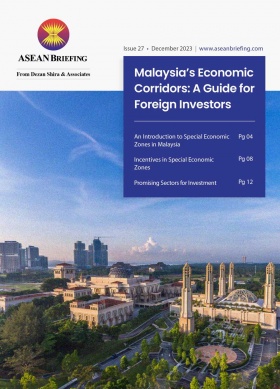Indonesia Economy Recap for 2023
We recap key economic highlights from Indonesia in 2023, including top sources for foreign direct investment (FDI) to the country and notable sectors attracting the bulk of foreign investment.
Indonesia received total investments (foreign and domestic) of approximately 1,053 trillion rupiah (US$67 billion) for the period between January to September 2023 according to data from the Indonesian Investment Coordinating Board, or the BKPM. From this total, an estimated 559 trillion rupiah (US$35 billion) came from foreign investments.
Indonesia has targeted 1.4 trillion rupiah (US$89 billion) in combined foreign and domestic investments for 2023 and 1.6 trillion rupiah (US$102 billion) in 2024.
As with 2022, Indonesia has seen most of the foreign investments in the downstream commodity industries, particularly in minerals.
Indonesia’s top FDI sources for January-September 2023
The top five sources of foreign investment in Indonesia for this period are as follows:
- Singapore – US$12.1 billion;
- China – US$5.6 billion;
- Hong Kong – US$5.2 billion;
- Japan – US$3.3 billion; and
- United States – US$2.4 billion.
Notable sectors that attracted major foreign investment in Indonesia in 2023
The basic metals industry continues to attract most FDI
Indonesia’s basic metals industry continues to attract the most FDI with the government pushing investments into the downstream sub-sectors.
The country seeks to exploit its abundance of mineral resources to develop its downstream mineral industry, particularly for nickel. Indonesia is home to the world’s largest nickel reserves, which are at an estimated 22 million tons, and the country is leveraging those reserves as well as other minerals to attract FDI in the development of local smelters. As such, the export value of processed nickel contributed significantly to government revenues in 2022, reaching US$30 billion; a huge increase from just US$1 billion in 2015.
In addition to investments in smelters, Indonesia recorded downstream investments in oil and gas, oleochemicals, pulp and paper, and electric batteries. In total, the country recorded US$8.7 billion in FDI for the basic metals industry from January-September.
Further, Indonesia saw 266 trillion rupiah (US$16 billion) in total downstream investments for the same period.
Nickel mining is one of the top sectors where Indonesia is expected to see increased foreign investment in 2024.
Nickel is an important component in the production of stainless and electric vehicle (EV) batteries. Indonesia is aiming to be a global EV manufacturing hub and has targeted to become one of the top three producers of EVs and EV batteries in the world by 2027.
Transportation and telecommunications
The transportation and telecommunications sector attracted US$4.2 billion in FDI between January-September 2023.
As an archipelago that covers over 17,000 islands, the development of transportation has been challenging for Indonesia, and the country has one of the highest logistic costs in Southeast Asia. Improving the connectivity between the islands is crucial to not only lowering logistic costs but also boosting business competitiveness.
With regards to telecommunications, the sector is undergoing massive transformation, driven by increasing numbers of cellphone and internet users. With over 355 million mobile cellular subscriptions, Indonesia has the third largest cellular market in the world only behind India and China. According to Fitch Solutions, there were an estimated 258 million 4G subscribers and 79 million 3G subscribers.
Chemical and petrochemical industries
The chemical and pharmaceutical industries saw US$3.7 billion in foreign investment for the same time period.
Indonesia’s Coordinating Minister for Maritime Affairs and Investment Luhut Pandjaitan has stated that the country aims to have the world’s largest petrochemical industry. Part of this grand plan is to develop a chemical industrial complex in North Kalimantan province which is expected to contribute some 40,000 jobs and US$6.5 billion to the national economy. The complex will produce ethylene, xylene, and polyethylene, among others. Indonesia’s chemical industry is among the top three non-oil and gas processing contributors, with exports reaching over US$18 billion in 2021.
Up to 2030, the government is overseeing petrochemical projects valued at over US$30 billion.
Demand for pharmaceutical products and healthcare, in general, is increasing in Indonesia mainly due to a rapidly growing consumer class and better access to healthcare facilities. The country has the world’s largest free healthcare program with 246 million participants.
Pulp and paper
Indonesia’s pulp and paper industry received approximately US$2.3 billion in January-September of this year. Currently, the country’s pulp production is ranked eighth globally at 12.13 million tons per year whereas Indonesia also produces just over 18 million tons of paper annually, making it the sixth-largest producer in the world.
Conclusion
Overall, Indonesia’s strategic focus on various industries, coupled with its rich resources and ambitious development plans, positions the country as an attractive investment destination, offering diverse opportunities for investors across multiple sectors.
About Us
ASEAN Briefing is produced by Dezan Shira & Associates. The firm assists foreign investors throughout Asia and maintains offices throughout ASEAN, including in Singapore, Hanoi, Ho Chi Minh City, and Da Nang in Vietnam, in addition to Jakarta, in Indonesia. We also have partner firms in Malaysia, the Philippines, and Thailand as well as our practices in China and India. Please contact us at asean@dezshira.com or visit our website at www.dezshira.com.
- Previous Article Investing in Greater Kuala Lumpur
- Next Article Cambodia and France Engage in Double Tax Avoidance Agreement Talks







